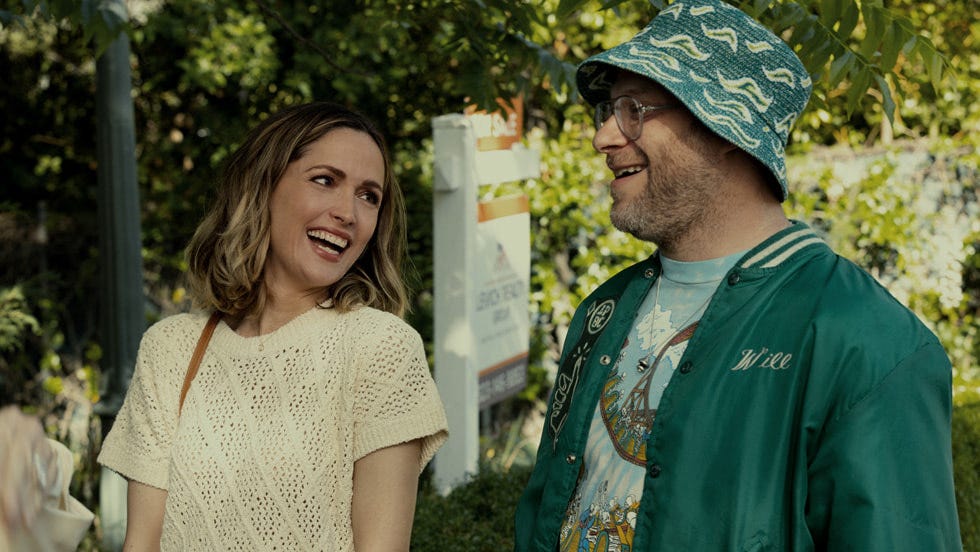The Companion 006: Apple TV's ‘Platonic’ falls flat
The show, starring Seth Rogan and Rose Byrne, was supposed to challenge the idea that men and women can't be mates.
I really wanted to like Platonic, the new TV show by screenwriters Francesca Delbanco and Nicholas Stoller, which premiered on Apple TV a couple of weeks ago. But having finished the series and spent some time reflecting on it, I have feelings.
For friendship nerds, the premise is intriguing and fresh — a comedy about two old friends, Sylvia and Will (played by Rose Byrne and Seth Rogan), messily reconnecting after a fallout many years previously. I was expecting, perhaps naively, a big, juicy, subversive take on what it means to have a best friend who is a different gender from you. Looking at the roles we’re forced into performing as women and men and how they can be dismantled.
Instead, the show highlights everything wrong with heteronormative friendship culture.
Platonic is not a disruptor to the depictions of male and female friendship on TV. As an example, one of the main arcs of the show isn’t really about their friendship at all, it’s about the idea that Sylvia’s husband, Charlie, becomes so paranoid that he believes that his wife is cheating on him with Will. He responds by actually cheating on her. This is presented as a somewhat reasonable reaction.
“I don’t like feeling like the second-most important man in your life,” says Charlie, just before he and Sylvia literally kiss and make up.
And really, much like with When Harry Met Sally, the originator in this genre, there really is a strong suggestion that Sylvia and Will are a little bit in love with each other. That men and women can’t actually just be friends, because, duh, all men and women are straight, white, married, traditionally good-looking, and bound to fall in love with each other (I’m being sarcastic).
I take umbrage with that. I definitely have seen a drop off in my friendships with men as I’ve aged. I can count on one hand the number of men, except my partner and my dad, that I speak to with any regularity. But I don’t believe this is down to inherent differences between the sexes, as Platonic seems unwilling to dispute, nor that friendship between heterosexual men and women is just a guise or a stand-in for our romantic relationships.
Yes, like probably everyone, I have definitely fancied a friend before. My current boyfriend was a friend for a long time before we got together. But I have also had many, many successful platonic relationships; some of which I wish I had worked harder at maintaining and, at least to my knowledge, were never disrupted by romantic feelings or jealousy.
Instead, the sticking point, I think, is much more down to the influence of the patriarchy, and the fact that men struggle to maintain deep friendships between themselves, let alone with women who aren’t their partners.
On the part of women, it can become tiring to feel like your efforts and energy to become closer or stay in communication with your male friends aren’t matched. We’ve often been socialised to treat our friendships in contrary ways. Sometimes, it can feel like what they offer in terms of friendship is surface-level in comparison to your female friendships, and only at their convenience.
These, are broad, sweeping generalisations of course — but they are played out in statistics and anecdotally. I’m not suggesting that these traits are inherent, but that they are less immovable than the toxic ideas that revolve around men being “ƒriendzoned” by women and not being able to control their “masculine urges” to attempt to turn every friendship into a fuck.
The show would have been far more interesting if the writers had been brave and hadn’t revolved around the main conflict in Sylvia and Will’s relationship around their partners’ (the reason why the pair fell out in the first place was because Sylvia didn’t get along with Will’s wife). Despite some clunky dialogue suggesting otherwise, it ultimately comes off like their romantic relationships have to be prized over their friendship rather than it being a mutable balancing act.
In short, the show is a bland, backwards attempt at exploring friendship. It reinforces many stale gender stereotypes and is uninterested in the myriad of complexities across genders, queerness, and race that are a part of modern life and which can influence who we choose to spend our time with.
I wouldn’t recommend it as a watch, but I’m interested to hear your thoughts on it, and — to cheer me up — some of your recommendations of good TV shows or films to watch about friendship. Leave them in the comments!





Really interesting and insightful perspective. I didn't dislike it, but I agree that there's definitely a romantic/non-platonic undertone to their relationship! But maybe it's also difficult to not interpret a childish sort of chemistry between two hetero middle-age adults in this way?